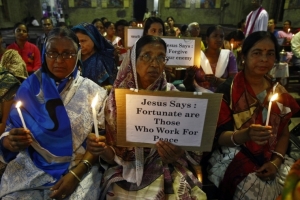Joker: My life is nothing but a comedy
“My life is nothing but a comedy.”

These are the harrowing words delivered by leading-man Joaquin Phoenix in the film Joker. Phoenix’s impressive portrayal of Arthur Fleck, or “The Joker,” has earned him an Oscar for Best Actor in a Leading Role.
Perhaps it was Phoenix’s performance that made Joker so compelling for people. There’s no debate that it was captivating to audiences, having set records with its October release and being the first R-rated film to gross over a billion dollars. It was undoubtedly a box office success.
The chilling story also gripped audiences. Like watching a train wreck, the story of Arthur Fleck is simultaneously horrifying and spellbinding. We watch as Fleck, a failed comedian living in desperate conditions in Gotham City, stumbles from one disappointing venture to the next, attempting to find community, belonging, and purpose. Sadly, his search is met with cold disregard at best and sheer vitriol at worst. We witness his descent into worsening mental illness, quickened by the mistreatment he receives and the vile acts he witnesses, which eventually lead to his violent persona, “The Joker.”
The end of the film has a particularly disturbing scene. We get a glimpse into Fleck’s mind as he fully succumbs to his mental illness and embodies “The Joker.” He reveals what has warped him into the very evil that he hated so much, stating: “Nobody’s civil anymore. Nobody thinks what it’s like to be the other guy.” Shortly after, he murders a man in cold blood.
Nobody’s civil anymore. An exaggeration? Perhaps for some. But for Arthur, that fairly accurately sums up his entire life. Abused, deceived, mocked, manipulated, exploited – he was defined by sorrow. Perhaps as egregious as the injustices themselves that were inflicted upon him was the amount of cold disregard he received in response – no one stepped in to help.
This is the origin story of one of DC Comic’s most notorious villains: unbearable sorrow that led to mental illness that led to violence. And while it’s just a story, one wonders: what intervention might have stopped Arthur Fleck’s plunge into darkness? “Nobody’s civil anymore,” he asserts. But what if that hadn’t been true?
Arthur Fleck didn’t need bureaucracy providing stiff, unfeeling “help” – the listless social worker assigned to his case demonstrates this. Sitting in her dreary office after their typical uninspired conversation, Arthur confronts her: “You don't listen, do you? I don't think you ever really hear me. You just ask the same questions every week. ‘How's your job?’ ‘Are you having any negative thoughts?’ All I have are negative thoughts.” Clearly that mandated relationship wasn’t the answer.
Fleck also didn’t need a lecture about “pulling himself up by the bootstraps.” Though such advice theoretically comes from a good place, it ignores the crucial role healthy support systems play in elevating a person out of poverty. Its inevitable result is animosity – an ever-deepening divide between the haves and the have-nots.
No, Arthur Fleck didn’t need either rigid bureaucracy or callous indifference. What he desperately needed was a true friend – someone to offer loving guidance and comfort amid hardship. He needed life-giving, joy-inspiring relationship. He needed civility.
What if he had been offered authentic compassion, coupled with a vision for a better future for him and a healthy amount of challenge to get him there? Life might have looked very different for Arthur Fleck had that been the case. Had Arthur Fleck encountered that kind of loving, neighborly care, maybe he would have arrived at a different conclusion:
“My life is valuable, and I have a purpose.”
Savannah Aleckson is the Regional Director for the True Charity Initiative in the Joplin, MO area. True Charity works to equip men and women with the principles and practice of effective charity. You can read more about the Initiative here.




























